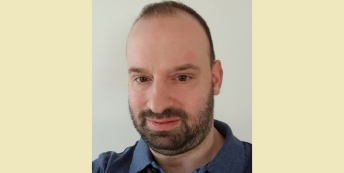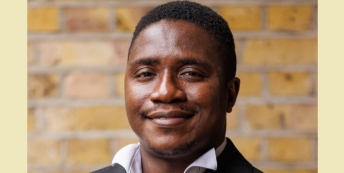“I’d been given a gift for a reason; hiding it away was sacrilege.”
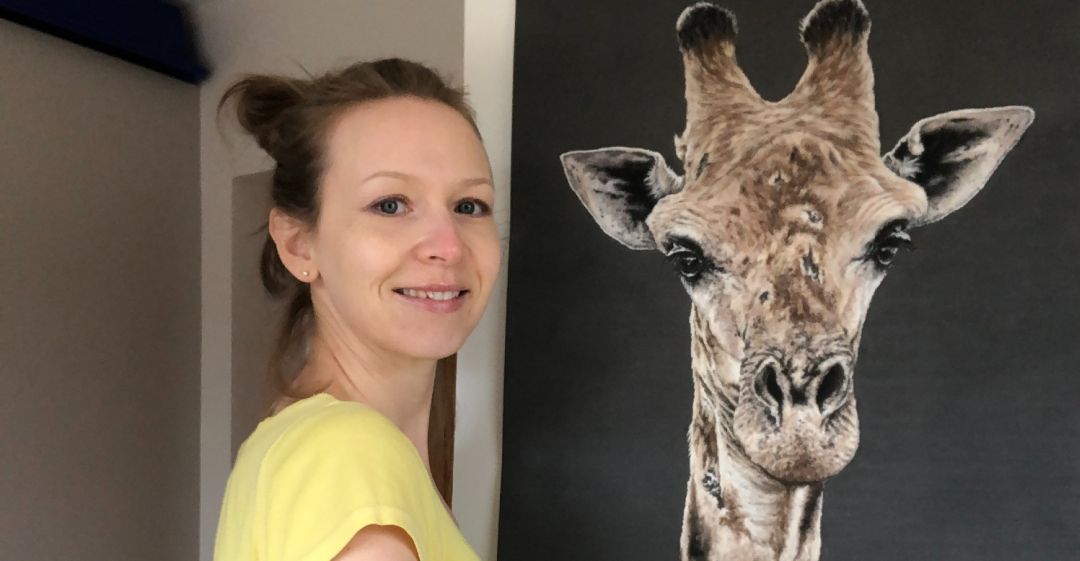
Newly Updated
What work were you doing previously?
I was working in Event Management, specialising in overseas incentive travel programmes.
I had started out by chance on a three-month temporary contract, and over nine years later I was still there.
What are you doing now?
I have a portfolio career made up of my main safari wildlife art business, flanked by freelance jobs here and there.
How did you feel in your work before you decided to make the change?
I was proud of what I’d achieved over the years and extremely grateful for all the opportunities and rewards I'd received.
I’d grown in skills and confidence and had become a master of my craft; but I didn’t want to progress up the ladder, which limited how I could continue to push and test myself.
Why did you change?
I knew I needed a new challenge.
I'd already made improvements on processes and honed the way projects ran. I didn’t want to get to the point where I felt stale and like I was just going through the motions.
When was the moment you decided to make the change?
Unfortunately, or perhaps fortunately on reflection, I was made redundant.
It was an enormous shock that blind-sided me, but it was the push off the cliff I needed to see if I could fly on my own.
In all honesty, I imagine I would probably still be in the same job if the redundancy hadn’t happened because I was too scared to jump into the unknown.
How did you choose your new career?
I felt like I’d been presented with a situation to start over, so I had to focus on what would make me happy long-term rather than a quick-fix solution.
I went back to my roots and focused on what I loved doing as a child. I wanted to understand what I was drawn to naturally; what I do without any concept of money.
People used to always comment on my artistic abilities, and I had a revelatory moment when I realised that what seems ordinary to me are skills and talents that other people dream of having.
That jolted me. I realised I’d been given a gift for a reason; hiding it away under cobwebs for over 15 years was sacrilege.
My art degree made me very aware of feeling stifled, ticking boxes to suit the tutors and achieve grades, so it’s been fundamental for me to create work that I want to make. That creative freedom allows me to shine brighter.
Are you happy with the change?
Absolutely.
I’ll be honest; it has been tough and there were many tears in the early months because I felt lost and alone while I found my feet, but I tried to keep focused on the positives and the benefits.
My feelings were up and down more times than a yo-yo. Every time I picked myself up again it was because I could see the value, self-worth and happiness I was getting from the improvement in my artwork.
The learning curves have been astronomical. I’ve gained more self-confidence knowing that I am the sole reason why things have progressed. I’ve had to live outside my comfort zone which has been tough, but I’m proud that I keep learning and continue to push the envelope to open up further opportunities.
What do you miss and what don't you miss?
I’ve missed the relaxing thoughts of a guaranteed monthly salary and the luxury travel trips that were a bonus for all the long, hard hours of work, but then again, there’s no saying I can’t work them back into the future mix somehow or other.
I’ve missed colleagues, especially those with experience or specialist roles whom I could call upon or syphon elements of work out to. Now, I’m not just an artist, I’ve had to become my own marketing, sales, finance, website and admin person too. It’s taken a long time to adjust.
I don’t miss the volume of emails or hours sat in front of a computer. I still have to have ‘computer days’, but at least I can intersperse with my artwork so I get more variety.
How did you go about making the shift?
I took about four months to regain confidence in my art skills.
I had to start off using coloured pencils over the top of photocopied pictures, because I was too nervous setting out with a blank piece of paper. I was gradually able to dust off the pastels, which I hadn’t touched in 17 years.
I did a couple of business courses and some informational interviews to help fill in the gaps where I had little or no knowledge. It was important to keep everything rolling forwards and in tandem, however slow the progress was.
The art needed the business and the business needed the art, so there were many balls to be juggled. This all coincided with the pandemic and first lockdown. I felt lucky, in a way, that the world was put on pause, because it gave me a chance to catch up a little.
How did you develop (or transfer) the skills you needed for your new role?
I realised that I'm a student for life. I've continued to seek out courses / books on specific subjects where I need to improve my knowledge.
To continue to evolve and grow, I keep pushing outside my comfort zone. I’ve mixed hard work and practice with learning from others who are more expert than I am. I’ve not been afraid to expose my vulnerabilities or inexperience to ask others for help; everyone has to start somewhere.
It’s also important to appreciate the fact that I’ve not just started out as an artist, I’ve had to take on another five or six roles (marketing / sales / finance / website, etc.) that don’t come as naturally to me, that other people do as their sole careers.
I'll never be as proficient as specialists in these subject areas and that’s OK, but I can continue to keep learning and improving as I go.
All I can ever do is my best and mistakes along the way are good lessons for the future.
What didn't go well? What wrong turns did you take?
I found it difficult to get past the overwhelm of over-thinking business decisions.
I felt like I had to get everything perfectly right the first time around. I imagined that people would judge me for not knowing what I was doing. I worried about all manner of scenarios that might never happen, and it was exhausting.
I’ve now managed to adopt a mantra: I will deal with whatever might happen if it actually happens. The imaginary ‘what-if’ scenarios waste a lot of energy!
For a long while, I let the months of receiving no income affect my value and self-worth. It was mentally tough knowing a high percentage of the population were furloughed, while I was working hard, trying my absolute best, and still struggling to make money.
I soon realised that way of thinking wasn’t helping; there was nothing I could do about the situation other than to change how I perceived it, and what actions I could take.
How did you handle your finances to make your shift possible?
Luckily, I had my redundancy pay and savings to fall back on, and lockdown also meant I could live rather frugally.
I’ve always been sensible with saving and not spending unnecessarily, so I’ve made conscious decisions as to what are suitable expenses for the business.
I’m currently making a fraction of my old salary, but I’ve gained so many life lessons and I know that building a business from zero takes momentum. I remain realistic and know that the finances will improve as I gain further exposure to more clients.
What was the most difficult thing about changing?
Having to deal with the terrifying ‘unknown’ and shaking off limiting beliefs that were holding me back.
My relationship with myself has been definitely one of the most crucial parts to conquer. My inner voice can either help pull strings of success, or of sabotage.
What help did you get? 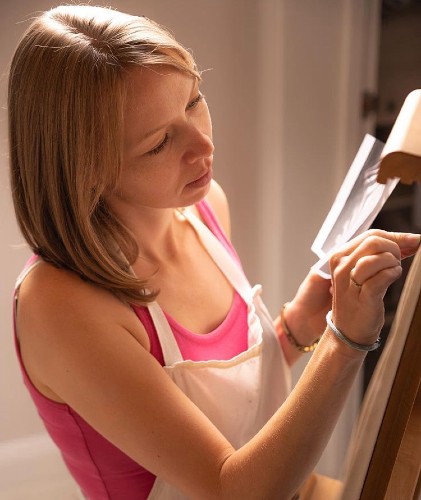
Three courses were key to my journey and I felt like they came about in the perfect order, because the learning from each one further built on the previous one.
The Careershifters Career Change Launch Pad was the first building block. It took me back to basics and helped me identify what I wanted to do.
Once I’d started on my artwork later that year, I realised I needed help with the business side of things. So, I enrolled on the Rebel Business School course.
The universe was obviously looking out for me as the course took place just prior to the pandemic kicking off. I know I got through lockdown and to where I am today because of the principles I learnt during those two weeks.
Finally, I took part in the Wellbeing Workout with the Art of Brill Team, as I recognise the importance of self-development and personal positivity. My career, my business and myself are three points of a triangle that all interrelate and support each other, so it was important to focus on advancing each one separately.
What resources would you recommend to others?
The three courses mentioned above.
Whatever industry you're involved in, I think it's important to continue to learn, grow and improve, not just your specialist subject area but yourself too.
What have you learnt in the process?
I am the sole creator of what happens to me.
Nothing is just going to land in my lap. If I want something, I have to go out there and see if I can get it.
Everything is a learning curve. Whether something goes well or not so well, it's a chance to identify how I'd go about it differently next time, or even not try it again!
I am more capable than I sometimes give myself credit for. Placing value on myself and my abilities has increased my faith that anything is possible if I keep trying.
Having the courage to trust myself and really knowing what I want has given me confidence to follow what feels right for me, rather than blindly following what others do.
Just because something's right and works for them, doesn’t automatically mean it's the right choice for me. I focus on listening to my intuition and running my own race.
It is as easy or as hard as I make it. Mindset and perspective is everything!
What would you advise others to do in the same situation?
Step out of your head and into your heart. The logistics and procrastination will only create excuses for why you continue to stand still.
If you aren’t happy, don’t waste life sticking with the same old habits. You don’t want to look back on wasted years thinking, I wish I’d done something sooner. Life is precious – live it by doing what you love!
We caught up with T recently to see how her shift was working out, four years on. Here's what she's been up to, and the biggest lessons she's learned.
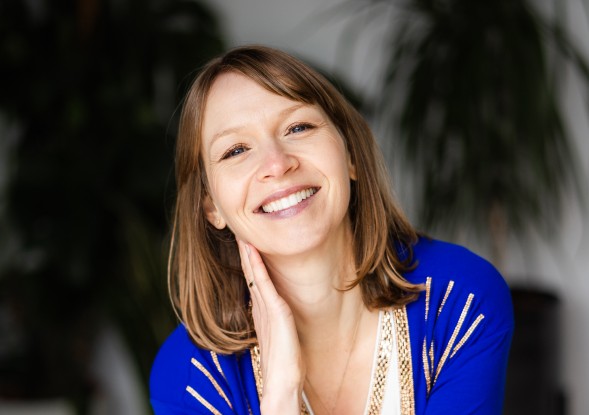
What's changed for you in your career since we first published your story?
I view it less like a 'career' and more like a lifestyle now.
I still mix creative projects with events work and I wrote my first romance novel last year ..... I’m currently seeking a literary agent to get it published (big shout out to anyone who can help me!).
My perspective is more focused on personal fulfilment and understanding what the meaning of life is for me. It's very much about stepping outside of the societal matrix, which at times can be rather daunting!
How do you feel about your work now?
The business of art is hard!
I’ve been on the edge of giving up more times than you could imagine, and yet the thought of going back to a 'normal 9-5' is what spurs me on.
It's challenging to step out on my own and forge my own path, yet all the inner work and self-development I've done and continue to do, keeps pointing me in the direction away from the 'societal norm'.
I think it's always going to be an evolving situation as I continue to learn, grow, meet new people, come across new circumstances etc.
I don't feel like I've hit the nail on the head yet as I'm yet to catch the ultimate wave and flow of what I want to be doing. Then again, it's also about what I'm lining my expectations and judgements up against - something I'm still in the process of working on!
What challenges have you come up against since making your shift, and how exactly have you dealt with them?
I’m aware that the skills/attributes/qualities required of me to be a great artist/creative are somewhat different from those of being a successful business entrepreneur, so navigating the disharmony between the two has been both upsetting and unsteadying.
It's made me really dig deep in knowing myself on an entirely different level, which I know I would never have accessed if I'd stayed employed.
Suicide bereavement within my family has also made me view life/work differently e.g. what is the point of life? I know it's definitely not to just work, chase money and pay bills.
How is the financial side of things panning out, and is this what you'd expected?
Perhaps sometimes in life the question of finances is less relevant. It's more about where you place your time and value.
For example, I spent months and months writing my novel and have received zero money from it so far, however, I now have a 90,000 word manuscript. I've turned something from my imagination into tangible reality and I've proved to myself that a dream I've had for decades can actually be achieved.
The level of pride and self-achievement I have doesn't equate to the perceived monetary value I've currently received.
I guess the question for shifters to ask regarding finances is: What's most important to you? What's a requirement? What's a necessity?
Don't make money the main reason why you make a career decision because it really isn't the be all and end all. If necessary, you'll make adaptations to your lifestyle or supplement in another way.
What have you learned, since making your shift?
Life is so much more than a surface level job/career.
It's about doing what lights you up,knowing yourself deeply and making choices that come from within (not choices based on others; either what they want of you or what you perceive/think they want from you).
I've not made things easy for myself and yet I'm still drawn to follow the rocky, unkempt path that is entirely my own creation rather than follow the smooth, tarmacked road most other people roam on.
Is there anything else you'd like to share?
If you'd like to buy or commission a unique, original pastel artwork, I'd love to hear from you.
If this article has inspired you, or if you’re interested in safari, do check out my website.
To find out more about T's work, visit https://tjallenart.com
Second photo © Neil Cannon, third photo © Vicki Knights.
What lessons could you take from T's story to use in your own career change? Let us know in the comments below.
T took part in our Career Change Launch Pad. If you're ready to join a group of bright, motivated career changers on a structured programme to help you find more fulfilling work, you can find out more here.

